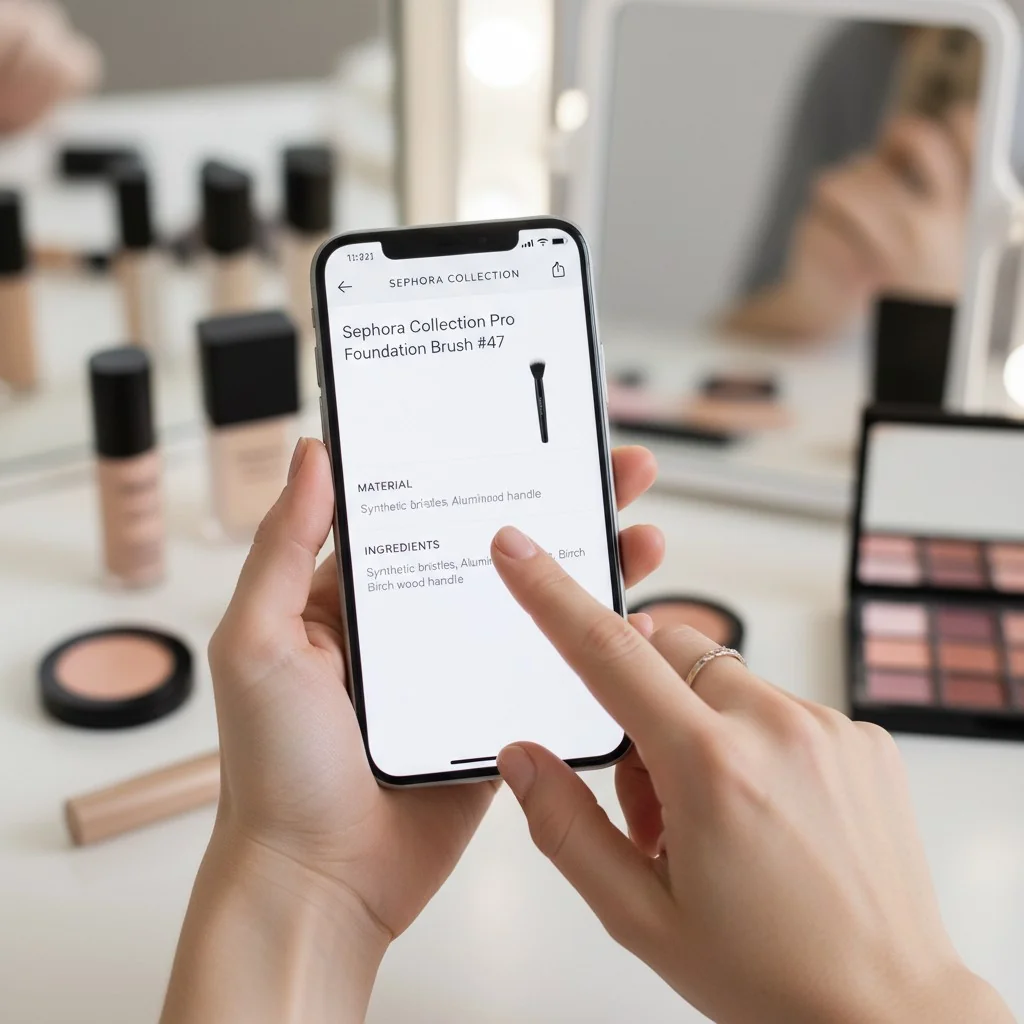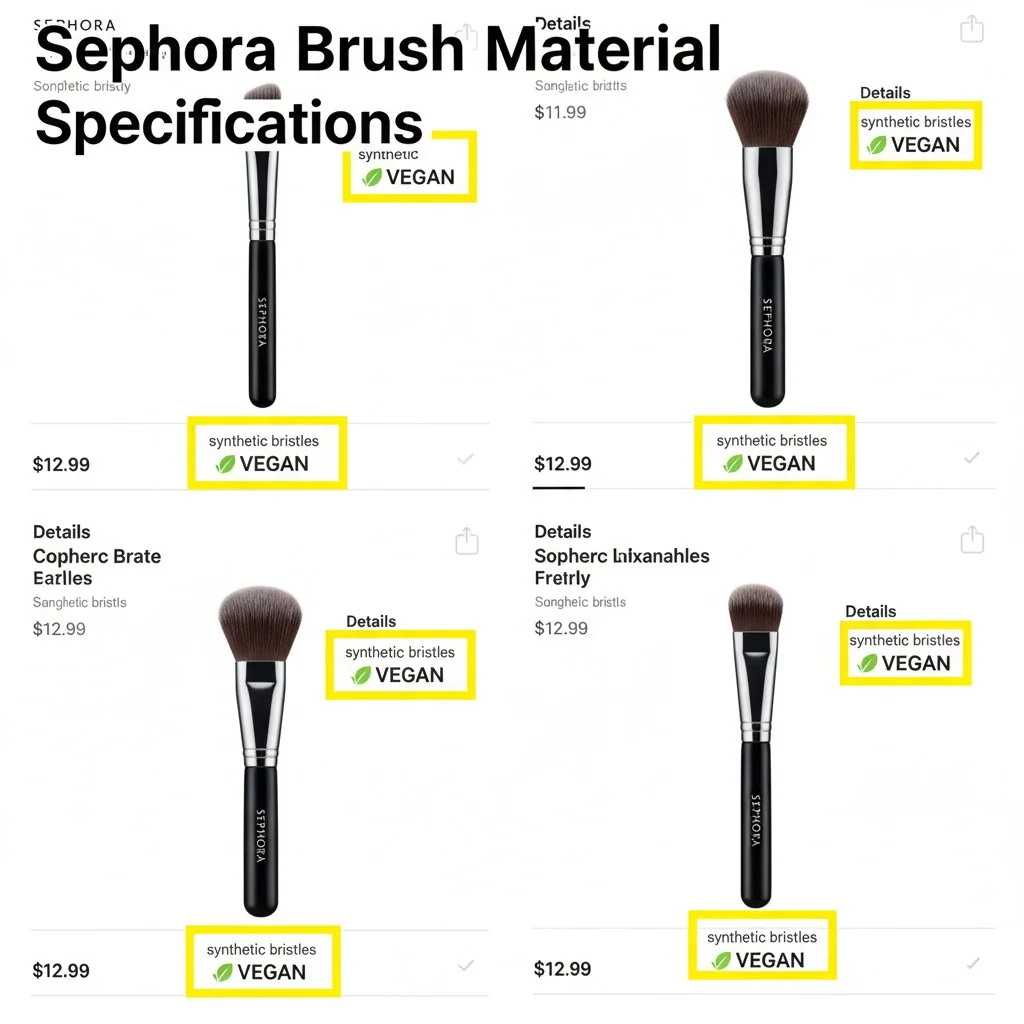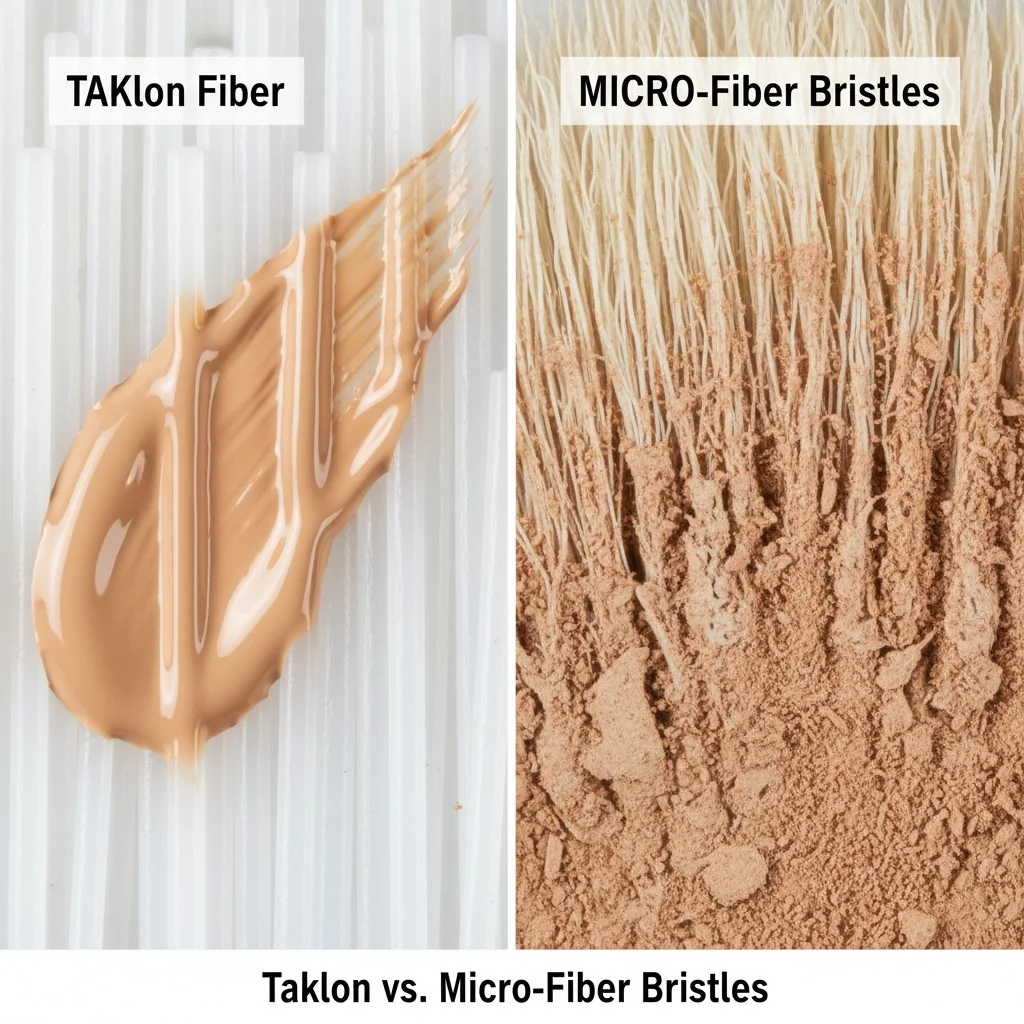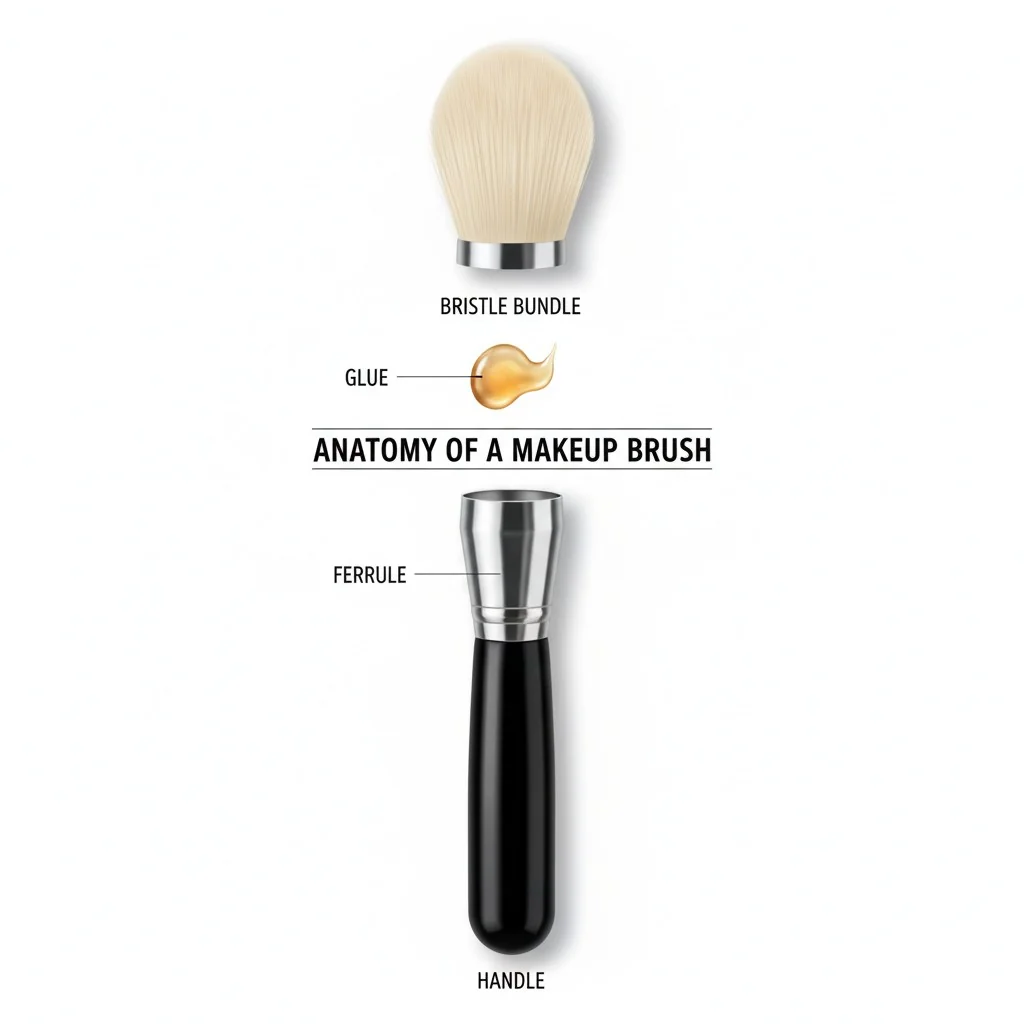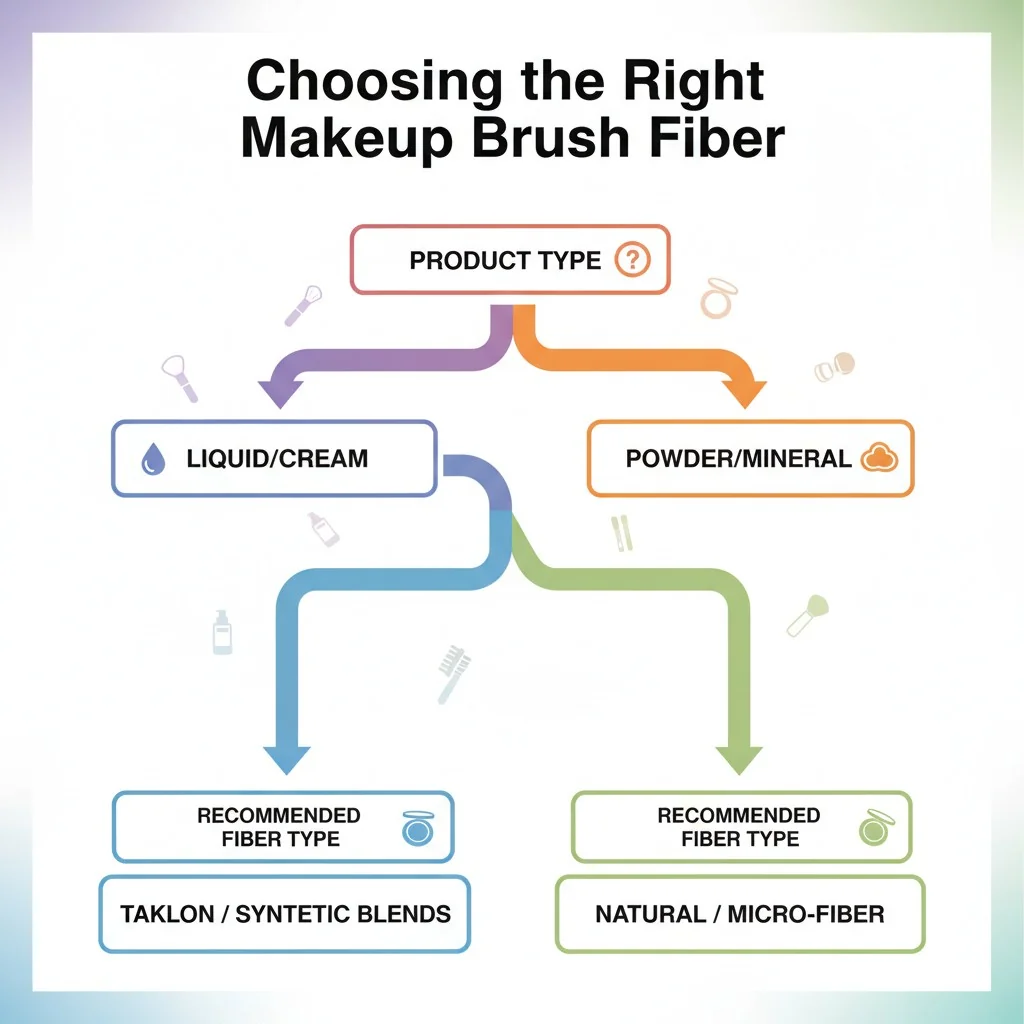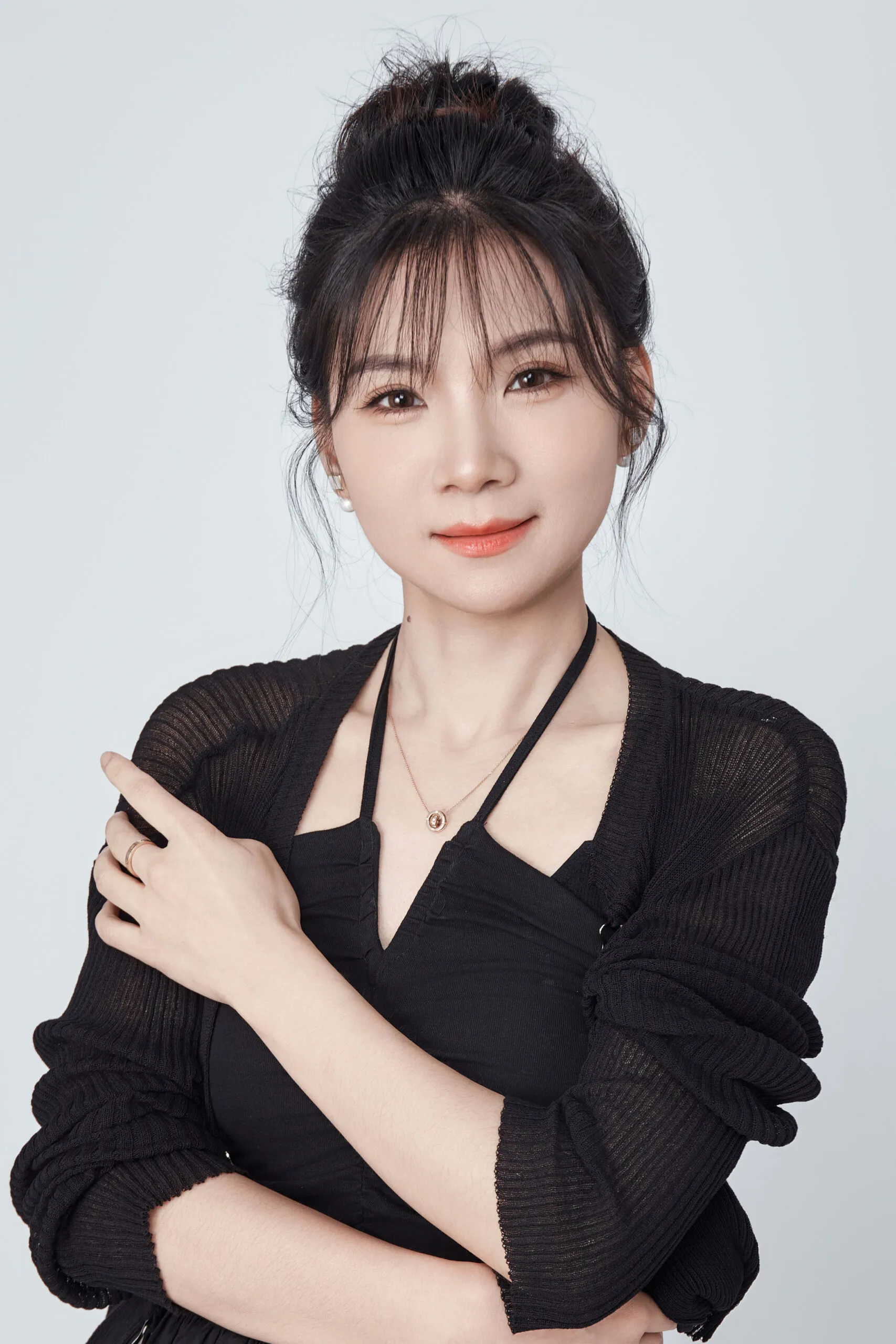Are you trying to figure out what materials Sephora uses in their brushes? It can be confusing. This guide breaks down their materials to help you make smarter choices for your brand.
Sephora Collection makeup brushes are primarily made with synthetic PBT/taklon bristles1, paired with wood or plastic handles and metal ferrules. You should always check each product page’s “Details” section for the exact fiber, which is often listed as “synthetic” or “vegan,” because materials can vary by SKU.
Understanding the materials in a big-name brand like Sephora is more than just trivia. For a brand founder like you, it’s market research. It tells you where the industry is heading, what customers expect, and what quality standards you need to meet or exceed. When I started on the factory floor, I learned that a brush is a system. The bristles, the handle, and the glue all work together. Knowing how each part is made helps you design a better product and avoid common quality problems. Let’s dive into the details so you can source your own brushes with the confidence of an expert.
All Sephora brushes are made with natural animal hair.False
This is false. The vast majority of the current Sephora Collection line has migrated to high-performance synthetic fibers, with many SKUs explicitly labeled 'vegan' or 'synthetic bristles' on their product pages.
Synthetic brush fibers can be engineered to perform as well as natural hair for powder products.True
This is true. Modern premium synthetic fibers, like micro-crystal fibers, have textured surfaces and fine diameters that allow them to pick up and diffuse powder products effectively, rivaling the performance of traditional natural hair.
Material overview: What fibers does Sephora use across its brush lineup?
Are you wondering if Sephora brushes are all synthetic or if some still use natural hair? This uncertainty makes it hard to benchmark for your own brand’s cruelty-free claims2. Let’s look at their current lineup and define what "synthetic" and "vegan" really mean.
Most current Sephora Collection brushes use synthetic fibers, mainly a type called PBT or taklon. "Vegan" in this context means no animal-derived components were used in the entire brush. Always check the product’s "Details" section on their website, as some older or specialty brushes might differ.
The Market’s Shift to Synthetics
The beauty industry, especially in mass retail, has moved strongly toward synthetic fibers. I’ve seen this shift firsthand in my factory. Brands choose synthetics for a few key reasons: cost, performance consistency, and ethics. Consumers are more aware of animal welfare, and "cruelty-free" is a powerful selling point. If you look at Sephora’s website, you’ll see most of their Sephora Collection brushes are now listed with "synthetic bristles." This isn’t a compromise on quality anymore. The technology has improved so much that synthetics can outperform natural hair for many applications.
Defining PBT/Taklon and "Vegan"
So, what is PBT/taklon? It’s a type of polyester fiber that is engineered to act like natural hair. The fibers are created with tapered tips, which makes them soft and helps them pick up and apply makeup smoothly. When a brush is labeled "vegan," it means more than just the bristles are animal-free. It also means the glue holding the bristles (some old formulas used animal-based adhesives) and any handle finishes are also free of animal byproducts. For your brand, getting a "vegan" certification requires your manufacturer to provide documentation for every single component.
A 'vegan' brush only refers to the bristles being animal-free.False
This is false. A truly vegan brush must also use animal-free components for the glue that binds the bristles and any lacquers or finishes on the handle.
Most brushes in the Sephora Collection today are listed as having synthetic bristles.True
This is true. A review of the product pages for the Sephora Collection Pro and classic lines shows that 'synthetic bristles' is the most common material listed, aligning with market trends toward vegan and cruelty-free tools.
Synthetic fiber families explained: PBT/taklon vs premium micro‑fibers?
You see "taklon" and "micro-fiber" on brush specs, but they can seem the same. Choosing the wrong one means your powder brush won’t pick up pigment, or your foundation brush will leave streaks. I’ll explain the key differences and how they perform with different makeup formulas.
Standard PBT/taklon is a smooth, polyester-derived fiber that is great for creams and liquids. premium micro-fibers3, sometimes called micro-crystal fibers (MCF), are engineered with textured surfaces for superior powder pickup, which mimics the performance of natural hair.
PBT/Taklon: The Workhorse for Liquids
Think of standard PBT/taklon as the industry’s go-to synthetic fiber. Its main advantage is its smooth surface. Because it’s not porous like natural hair, it doesn’t soak up liquid or cream products like foundation and concealer. This means less wasted product and a more even, streak-free application. It’s also very durable and easy to clean. In the factory, we can get these fibers from various resin producers, and they provide a reliable, consistent quality that is perfect for foundation, concealer, and cream blush brushes.
Premium Micro-Fibers: Engineered for Powders
For years, the biggest complaint about synthetic brushes was that they couldn’t pick up powder as well as natural hair. Premium micro-fibers are the solution to that problem. These are advanced synthetic fibers that have been mechanically or chemically treated to create micro-textures along the surface. This texture grabs onto powder particles, from loose setting powder to pressed blush. They are also made with a much smaller diameter, which makes them feel incredibly soft and luxurious. This technology allows brands to offer a fully vegan line without sacrificing performance in their powder brushes.
| Fiber Family | Best Product Type | Feel | Cost Tier | Typical Retail Usage |
|---|---|---|---|---|
| PBT/Taklon | Creams & Liquids | Smooth, Firm | $$ | Foundation, Concealer |
| Premium Micro-Fibers | Powders | Very Soft, Fluffy | $$$ | Setting Powder, Blush, Eyeshadow |
| Natural Hair (Legacy) | Powders | Soft, Porous | $$$$ | High-end Blending, Eyeshadow |
The smaller a brush fiber's diameter, the cheaper it is to produce.False
This is false. Smaller diameter fibers require more advanced manufacturing processes and are more expensive. However, they result in a much softer and more luxurious feel on the skin.
Premium synthetic micro-fibers are designed to pick up powder better than standard smooth taklon.True
This is true. The engineered texture on the surface of micro-fibers creates more surface area to grab and hold fine powder particles, a function that smooth taklon fibers cannot perform as effectively.
Build quality beyond bristles: Handles, ferrules, glue systems, and QC?
Your sample brush looks great, but will the bulk order shed or fall apart? A loose ferrule or shedding bristles can destroy your brand’s reputation for quality. I’ll show you the hidden factory details that determine a brush’s true durability.
A brush’s quality depends on more than just its bristles. Handles are typically wood or plastic, and ferrules are aluminum or brass. The real difference comes from using strong epoxy glue and ensuring a tight ferrule crimp to prevent shedding and looseness.
Handles and Ferrules
The handle is what your customer holds, so its feel is important. Wood handles, often birch, have a nice weight and classic feel, while molded plastic or resin handles allow for unique shapes and colors. The ferrule is the metal band that connects the bristles to the handle. Aluminum is common because it’s lightweight and affordable. Brass is heavier and more durable, giving a brush a more premium feel, but it also costs more. The choice depends on your brand’s target price point and desired aesthetic.
The Unseen Heroes: Glue and Crimping
From my experience on the factory floor, this is where many brands cut corners. The best bristles in the world don’t matter if they fall out. We use a strong, two-part epoxy glue to secure the bristle bundle inside the ferrule. The amount of glue and the curing process are critical. After gluing, the ferrule is placed onto the handle and mechanically crimped. A good manufacturer uses tight tolerances and often a "double crimp" to create a secure connection that withstands washing and daily use. This is what stops the dreaded shedding and handle wiggling.
Factory QC That Matters
When I oversee a production run, we don’t just look at the final brush. We check the raw materials. We measure fiber diameter4 ranges to ensure softness is consistent. We inspect the bristle tips to make sure they are tapered, not bluntly cut. We also control the bundling density—the exact weight in grams of fiber used for each brush head. A dense bundle provides more control, while a less dense one can feel flimsy. These small details are what separate a cheap, disposable brush from a professional tool built to last.
All brush handles are made from wood for a premium feel.False
This is false. While wood is a popular choice, many high-quality brushes use molded plastic, resin, or even metal handles to achieve specific design aesthetics, weights, and durability characteristics.
The type of glue and how the ferrule is crimped are critical for preventing brush shedding.True
This is true. From a manufacturing perspective, the adhesive system (typically epoxy) and the mechanical pressure of the crimp are the two most important factors in creating a durable brush that does not shed bristles or loosen over time.
Buyer’s decision rules: How to choose fibers by product type and compliance?
You need to source brushes for your new line, but you’re stuck on which materials to choose. Making the wrong choice can lead to poor performance, compliance issues in key markets, and wasted investment. Here is a simple decision-making guide for sourcing the perfect brushes.
For powders, choose premium synthetics with textured tips. For creams and liquids, use smooth PBT/taklon to minimize product absorption. Always select synthetic fibers to easily meet vegan and allergy-related compliance rules in the U.S. and Europe.
The Product-Fiber Decision Matrix
Choosing the right fiber for each brush is the most important decision you’ll make. It directly impacts how your customer’s makeup applies. Here is a simple guide I use with my clients:
- For Liquid Foundation & Concealer: Choose smooth PBT/taklon. It won’t absorb your expensive formulas, it applies product without streaks, and it’s very easy to clean.
- For Powder, Blush & Bronzer: Choose premium micro-fibers. Their textured surface picks up the perfect amount of powder and diffuses it softly onto the skin for a natural finish. This is where you can really compete on quality.
- For Eyeshadow Blending: Choose the softest premium micro-fibers you can. The softness and shape of the brush head are everything for achieving a seamless blend without irritating the delicate eye area.
Navigating Compliance for US/EU Markets
If you plan to sell in the U.S. or Europe, making your line fully synthetic is the safest and smartest path. It immediately allows you to claim "cruelty-free" and "vegan," which are huge selling points. It also avoids any potential issues with animal-hair-related allergies. When you work with a factory, make sure they can provide the right documentation to back up these claims. This is a common pain point for brand founders, and a reliable partner should make this process easy for you.
Balancing Cost, Quality, and Customization
Finally, your material choices will affect your cost. Standard PBT/taklon is more affordable, while premium micro-fibers are a bigger investment. However, that higher cost can be justified with a higher retail price because the performance is noticeably better. During the private label process, we can create samples with different fiber tiers so you can feel the difference and decide what best fits your brand’s quality promise and budget.
Natural hair brushes are the only option for high-performance powder application.False
This is false. Modern, premium synthetic fibers with engineered textures now match or even exceed the performance of natural hair for picking up and diffusing powder, without the ethical or allergy-related drawbacks.
Smooth synthetic bristles are generally best for liquid and cream products because they absorb less product.True
This is true. The non-porous surface of fibers like PBT/taklon prevents them from soaking up foundations and concealers, leading to less product waste and a smoother application compared to porous natural hair.
Conclusion
Choosing the right brush involves understanding fibers, construction, and your brand’s needs. Use this guide to source with confidence and build a line your customers will truly love.
References
-
Explore the advantages of synthetic PBT/taklon bristles for makeup application and their impact on performance. ↩
-
Explore the guidelines and best practices for making cruelty-free claims in the beauty industry. ↩
-
Discover how premium micro-fibers enhance the performance of makeup brushes, especially for powder products. ↩
-
Learn how the diameter of brush fibers influences their performance and application techniques. ↩
